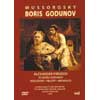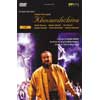Mussorgsky Khovanshchina
Flawed, but this old Bolshoi film repays study, as does the passionately conducted and finely sung epic from Viennese forces
View record and artist detailsRecord and Artist Details
Composer or Director: Modest Mussorgsky
Genre:
DVD
Label: Video Artists International
Magazine Review Date: 9/2004
Media Format: Digital Versatile Disc
Media Runtime: 108
Mastering:
Mono
ADD
Catalogue Number: VAIDVD4253

Tracks:
| Composition | Artist Credit |
|---|---|
| Boris Godunov |
Modest Mussorgsky, Composer
Alexander Pirogov, Boris Godunov, Bass Alexeï Krivchenya, Varlaam, Bass Bolshoi Ballet Bolshoi Theatre Chorus Bolshoi Theatre Orchestra Georgi Nelepp, Grigory, Tenor Ivan Kozlovsky, Simpleton, Tenor Larissa Avdeyeva, Marina, Mezzo soprano Maxim Mikhailov, Pimen, Bass Modest Mussorgsky, Composer Nikhandr Khanayev, Shuisky, Tenor Vassily Nebolsin, Conductor |
Composer or Director: Modest Mussorgsky
Genre:
DVD
Label: Arthaus Musik
Magazine Review Date: 9/2004
Media Format: Digital Versatile Disc
Media Runtime: 188
Catalogue Number: 100 310

Tracks:
| Composition | Artist Credit |
|---|---|
| Khovanshchina |
Modest Mussorgsky, Composer
Anatoly Kocherga, Shaklovity, Baritone Brigitte Poschner-Klebel, Susanna, Soprano Claudio Abbado, Conductor Goran Simic, Second Strelets, Bass Heinz Zednik, Scribe, Tenor Joanna Borowska, Emma, Soprano Ludmila Semtschuk, Marfa, Mezzo soprano Modest Mussorgsky, Composer Nicolai Ghiaurov, Ivan Khovansky, Bass Paata Burchuladze, Dosifei, Bass Péter Köves, Varsonofiev, Bass Slovak Philharmonic Chorus Timothy Breese, Strezhnev, Tenor Vienna Boys' Choir Vienna State Opera Chorus Vienna State Opera Orchestra Vladimir Atlantov, Andrey Khovansky, Tenor Wilfried Gahmlich, First Strelets, Bass Wilfried Gahmlich, Kuzka, Baritone Yuri Marusin, Golitsïn, Tenor |
Author: David Fanning
The 1954 Boris Godunov arguably tells us more about the Bolshoi tradition than about the opera. What we have here is a Rimsky-based mix-and-match version that conflates the two ‘original’ Borises and cuts the whole thing down to under two hours – no sign whatsoever of the Jesuit Rangoni in the Polish act, for instance. Some of the edits are extremely crude. Moreover, most of the cast has the repertoire of standard Bolshoian postures so deeply ingrained that there is little question of plumbing the psychological depths. Having said that, it is only Ivan Kozlovsky – reputedly Stalin’s favourite tenor – who pushes his interpretation of the Simpleton/Holy Fool into outright mannerism. On the plus side, Alexander Pirogov has the required vocal and histrionic range for the title role, without staking a claim to all-time greatness, Georgi Nelepp is outstanding as the Pretender Grigory, and Alexeï Krivchenya enlivens the wayside inn scene with a rollicking, larger-than-life account of ‘Once upon a time in Kazan’. Vassily Nebolsin conducts a solid, reliably paced account.
This production is conceived for film, which means several outdoor scenes and general over-dubbing, all skilfully done. The VAI cover stakes a claim for Vera Stroyeva as an emulator of Eisenstein. Certainly her direction is detailed and well rehearsed, but it completely lacks Eisensteinian flair and depth, and it is not without an element of staginess and over-acting. Of course much the same could be said of Western opera films of the time, and if you can adapt to those qualities and to the thinness of the orchestral sound, you should get a vivid enough impression of the opera, or at least of a sketch of it. You may even prefer its dramatic faithfulness to the highly interpreted 1990 Kirov staging conceived by another, more famous cinematographer, Alexander Tarkovsky (though this is a must for Gergiev’s conducting and for Robert Lloyd’s account of Boris).
The Vienna Khovanshchina is justly famed for the quality of the orchestral and chorus work under Abbado’s passionate conducting. It is uncut and in Shostakovich’s orchestration (Mussorgsky having left almost the entire opera in short score) except for the last scene, where Stravinsky’s 1913 working for Diaghilev is used – this is now generally regarded as being truer to the composer’s intentions. Alfred Kirchner’s direction is solidly realistic without being cliché-ridden, straying into gratuitous silliness only with the scene of the condemnation and reprieve of the Strel’tsï in Act 4. Erich Wonder’s sets are effective too. An added touch of symbolic interpretation comes with the pile of skulls projected onto the curtain at nodal points. But this is by no means inappropriate, since the self-immolation of the Old Believers is the trajectory of the drama as a whole; having said which, its appearance during the orchestral prologue would have been still more effective had it been placed a few seconds later, when the music itself darkens.
The cast is not entirely the same as on Abbado’s CD set (DG, 11/90). However, all the solo roles, from the most imposing to the most modest, are taken with distinction. Khovanshchina is more about historical issues than personal interaction, and the voices and stage presences are accordingly statuesque. ArtHaus’s documentation includes an adequate synopsis and background essay (though nothing like as penetrating as the contributions to the equivalent CD set), and there are decent subtitles. In other words there are none of the faults of presentation noted by Alan Blyth in his review of the Pioneer Laserdisc issue.
Discover the world's largest classical music catalogue with Presto Music.

Gramophone Digital Club
- Digital Edition
- Digital Archive
- Reviews Database
- Full website access
From £8.75 / month
Subscribe
Gramophone Full Club
- Print Edition
- Digital Edition
- Digital Archive
- Reviews Database
- Full website access
From £11.00 / month
Subscribe
If you are a library, university or other organisation that would be interested in an institutional subscription to Gramophone please click here for further information.




